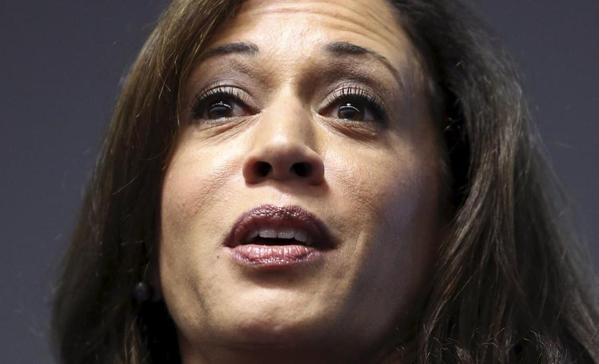Judge rebuffs AG Harris on donor disclosures
 California Attorney General Kamala Harris lost a high-profile lawsuit over her attempt to obtain donor records from an organization in the orbit of the Koch brothers.
California Attorney General Kamala Harris lost a high-profile lawsuit over her attempt to obtain donor records from an organization in the orbit of the Koch brothers.
Judging First Amendment protections to exceed what Harris had characterized as the confines of state law, U.S. District Judge Manuel Real ruled that “a nonprofit backed by conservative billionaires David and Charles Koch does not have to reveal its donors,” as the Los Angeles Times noted. Real “found that the Americans For Prosperity Foundation, a 501(c)(3) charity organization, can ignore Harris’s demand to turn over the names and addresses of those who have donated more than $5,000.”
“In court, state lawyers argued that the donor documents allow investigators to track improper loans and unfair business practices by nonprofits. But attorneys for the Americans For Prosperity Foundation countered that donors feared for their safety if their identities were somehow revealed. Judge Real agreed.”
Political motives
In a 12-page decision, Judge Real decided Harris’s argument was farfetched: “While Attorney General Harris argued that she needed donor disclosure to identify lawbreaking like ‘self-dealing’ or ‘improper loans,’ that was a stretch,” the Wall Street Journal recalled in an approving editorial. Real concluded that, “over the course of trial, the Attorney General was hard pressed to find a single witness who could corroborate the necessity of Schedule B forms in conjunction with their office’s investigations.”
Harris, as Bloomberg noted, has continued a policy of maintaining confidentiality with regard to names on donor lists. On the other hand, she has also established a track record of trying to expand state authority in what appears to be a partisan manner. “An ally of the plaintiff’s bar and unions as well as a candidate for U.S. Senate, Harris recently surfaced as a key player in the alliance of state attorneys general intent on using criminal investigatory powers to probe so-called climate denial at non-profit research and advocacy groups as well as at energy companies like ExxonMobil,” as Walter Olson noted for the Cato Institute. “That makes at least two episodes in which Harris personally has signaled interest in novel, aggressive steps to pry open the internal workings of private advocacy organizations that take positions opposed to hers.”
A federal fight
But the federal policy that lent Harris’s approach an imprimatur of reasonableness has become a target of reform in the wake of Judge Real’s decision. “Like other nonprofit groups in the state, the foundation was asked by Harris’s office to turn over a tax form listing its biggest donors that it already provides to the Internal Revenue Service,” according to the site. Now, the role of the IRS in donor databases has landed the agency in the crosshairs of congressional Republicans. “The House’s powerful tax-writing committee approved a bill Thursday that would ban the IRS from collecting the names of donors to tax-exempt groups, enraging campaign-finance watchdogs who say the move could open the door to secret, foreign money in U.S. elections,” as KGW reported.
The Ways and Means Committee approved the bill, the Preventing IRS Abuse and Protecting Free Speech Act, by a 23-15 vote along party lines, with Rep. Peter Roskam, R-Ill., arguing that groups exempt from taxation “should not be forced to expend precious resources on unnecessary documentation and tax administration rather than focusing on their charitable missions,” KGW added.
Critics bracing for the bill’s passage unsuccessfully scrambled to stop its progress. “Campaign finance reform and transparency proponents issued a letter calling on members of the Ways and Means Committee to oppose Roskam’s bill,” the Huffington Post noted. “Those backing the letter include Brennan Center for Justice, Campaign Legal Center, Common Cause, CREW, Democracy 21, Public Citizen, Sunlight Foundation and Rootstrikers.”
But even strong advocates for campaign finance reform and donor transparency have acknowledged that the IRS itself played a potent role in mobilizing Republican support for protecting tax-emempt organizations from excessive federal scrutiny. “Attempts to push disclosure legislation have repeatedly run aground on Capitol Hill amid forceful GOP opposition. Republicans in Congress also attached a rider to a spending bill last year that, for the moment, blocks the IRS from even writing new regulations to draw clear parameters around political activity,” according to the American Prospect. “Republicans are still livid that the agency targeted Tea Party groups and other conservative organizations seeking tax exemptions in 2013.”
Related Articles
Los Angeles books higher hotel minimum wage
If critics are right, room service in Los Angeles hotels could descend to that of the Bates Motel. Yesterday the City
CDPH Alters Cal DNA Experiment
Laura Sucheski: After Tuesday’s debate over the ethics of UC Berkeley’s “Bring Your Genes to Cal” freshman orientation activity, the
New DMV rules would allow testing of driverless vehicles without human in car
Responding to industry criticism and public uncertainty, California has rejiggered its rules to accommodate fully driverless vehicles. “California’s new proposals




